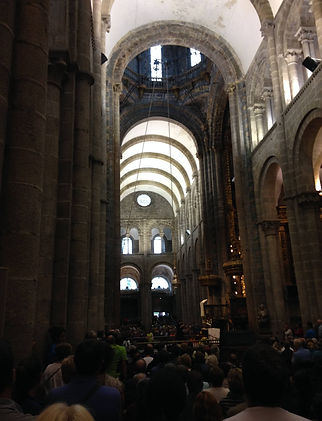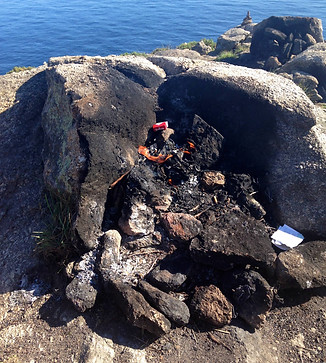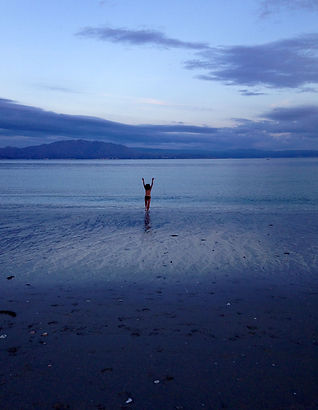Even the most beautiful Caminos come to an end
Anne and I completed our official camino by walking each step from Porto, Portugal to Santiago, Spain. Soon after entering Santiago we joined a long line filled with people, young and old, at the “Pilgrim’s Office” where we all excitedly received our beautiful Compostelas (Certificates of Completion). We had a wonderful, and crazy night of celebration on the streets of Santiago, drinking wine and dancing with strangers who felt like friends. It was one of the most joyous evenings of my life. The next morning we attended the beautiful Pilgrims’ Mass at the Cathedral of Saint James, where all who had completed a camino were welcomed in their native language. We witnessed the ritual of the beautiful, swinging botofumeiro that for hundreds of years has symbolized a blessing by the Holy Spirit. Even as I write about this today I feel chills deep inside of me as I relive the joy, pride, and reverence of those days. Still, in spite of our celebration rituals neither Anne or I felt entirely complete. We had heard that some people include in their pilgrimage a final day of walking between the tiny seaside town of Muxia, where Saint James was said to have lived out his final years, to the coastal town of Finisterre, once considered the most westerly point of Spain, or literally “The End of The Earth”.
Though this meant an additional twenty-four miles of walking, they turned out to be our very favorite miles of all. We had had a day of rest in Santiago, our feet had toughened up, and we savored what we knew was our last day of pilgrimage. It had rained the day before, but this day was clear, clean, and cool as we walked past beautiful beaches and meadows, and over clear streams on old rock bridges. There was no traditionally “right” direction to walk this stretch and so we walked both with, and towards, other pilgrims. The way was clearly marked and we’d thrown our directions away. We felt fully connected to God, to ourselves, and to each other. I can honestly say that each moment of that day was pure joy at the deepest level.
Finally we reached the fires of Finisterre and our pilgrimage came to its end. We didn’t get to linger long on that last afternoon, just long enough to sit for a time in solitude as we offered gratitude for the experience, and prayers that the change we sensed inside ourselves would stay with us even as we returned home. There was a full moon that evening, and distant fireworks to celebrate a local saint’s day. After a celebratory naked dip in the ocean, we got a good night’s sleep and boarded a plane home the next morning, our pilgrimage officially over.
Two months after returning home my father died. The first ten days after his death were a blur of details and, thanks to all of the logistics involved I don’t think I really got the chance to say “good-bye”. I wonder if there is more space to feel loss the further one is away from the loss itself.
Dad’s obituary was written by my oldest friend and chronicles a life filled with adventure, determination, faith, and drive. If life is a pilgrimage, my dad walked a long and full one. He spent 96 years making every day the best he could for himself and others. He took responsibility for his own business and, thankfully, he left no mess behind. He left his path through the world better, cleaner, and safer for having traveled it. He was by all accounts “a good pilgrim”.
Years earlier I had been with my dad when he received the news of his own father’s death. Dad was close to the age that I am now and “Pop” had just lost a battle to cancer at the age of 89. When the phone call came I saw my father cry for the first time in my life; I think this was more shocking to me than my grandfather’s death. I watched as he sat with sadness for a bit, and then he laced up his Nike’s and headed out with me to run my first half marathon. Though he had deeply respected and loved his father, I never saw him cry about his dad’s death again. I learned, for better or worse, something about life, death, and my father that day; Dad believed that an active and meaningful life isn’t shortchanged by death.
It’s not a coincidence that I have had to confront my own feelings about death, even as I adjust to my feelings upon completing my pilgrimage on The Camino. My father’s life pilgrimage wound down and came to the same abrupt end that I felt as I turned my back on the fires at Finnesterre and walked away. Life goes on, and others continue their own journey’s even as my fathers life and my camino are over.
The difficult part for me to wrap my mind around is that since I have been home, hundreds, if not thousands, of other pilgrims have begun, and completed their own pilgrimage. They have walked, wept, laughed, and learned lessons of their own. They have returned to homes all over the world, and to varying degrees felt their camino’s recede into their own memory. Some will have walked as many as seven weeks, some only seven days. In the end it won’t matter; the value never seems to lie in the length of the journey, but in the gift of having taken the journey. Even those who walked for the greatest number of days spent only a tiny fraction of time searching for arrows and scallop shells in the thousand year history of The Camino de Santiago.
Once again, The Camino has impressed upon me a valuable life lesson: As pilgrims, we all ended up in same place: In line at the pilgrim’s office in Santiago waiting to receive our beautiful compostelas. We hadn't fully realised, as we walked, how abrupt, and premature the ending would feel, no matter the length of our journey. I was glad that, like my dad, I had remembered to savor each step.
Reflections:
As we scanned the crowd at the pilgrim’s office we could see that while some people were certainly more banged up for having traveled those magical miles, one way or another our adventures had all come to an end. Since returning home I have adopted the perspective that it’s not the steps in my adventure, but the adventure in my steps, that matter the most. When I consider a thousand years of collective pilgrimage, does it really matter if I got to walk seven days or seven weeks? One way or another, every life pilgrimage, indeed every life, comes to an end. When I think about my father’s life wasn’t it, like any journey, but a blink of the eye? I'm trying my best to adopt my father's perspective that death never shortchanges a meaningful and active life. I'm taking to heart the words of Howard Thurman:
"Don’t ask what the world needs, ask what makes you come alive. And go do that. Because, what the world needs is people who have come alive."
Surely to be alive while one walks holds the greatest meaning of all.
1. If you had no shame, guilt, or fear how would you answer the question: What journeys do you have yet to take? (Both literally and metaphorically)
2. What adventures have you left undone? (Again, both literally and metaphorically)
3. What would you do next if you weren't afraid?

The Pilgrim's Mass inside the Cathedral of St James

The beautiful botofumeiro
was swung wildly

We shared a wonderful, joyful night of celebration

One of the many fires of Finisterre

A Skinny-dip in the ocean under fireworks and a rising full moon brought our pilgrimage to a final end
